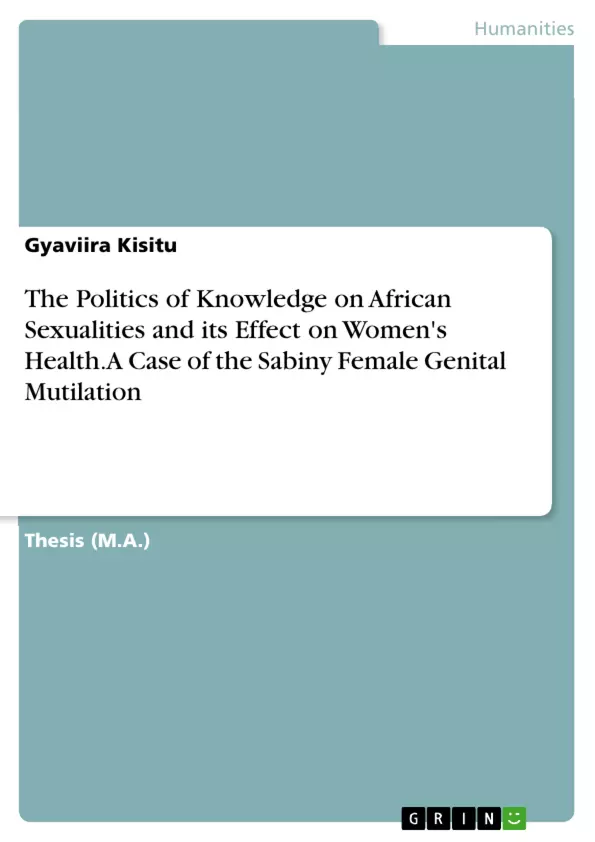The purpose of this study was to understand ‘What knowledge matters', and ‘Whose knowledge matters' in the study of African sexuality and in particular female genital circumcision. The Sabiny peoples of Uganda practice the tradition of wonsetapkoruk or wosho as a rite of initiation for girls. This practice is elsewhere understood as female genital cutting, female genital circumcision or female genital mutilation.
Discussions on African sexuality and female genital circumcision have taken either a Western perspective or an African point of view. Since the practice is understood differently, the values attached to it differ as a consequence of the wide range of opinions. In certain ways it is considered as a determinant of who has a normal sexuality or a normal body; distinguishes girls from women; confers true femininity as opposed to masculinity. Amidst these discussions, the aspect of women‘s health is peripheral and marginalized. Instead discussions seem to be limited by issues of language, naming, and standpoints by which various bodies of knowledge argue their different positions.
Communication between the various sides of the debate is also minimal. Despite the claims that female genital circumcision is harmful to women‘s health attempts to eradicate it are faced by resistances. Through an African feminist approach to the politics of knowledge on African sexualities, in this study I argue that the discourses on African sexualities and in particular those on female genital circumcision affect the understanding of women‘s health. Second, the different approaches employed in the discussions of female genital circumcision evaluate the practice using different scales of values which affect the understanding of health through what they neglect or take for granted.
Inhaltsverzeichnis (Table of Contents)
- Abstract
- Dedication
- Acknowledgements
- Glossary of Acronyms and Abbreviations
- Chapter 1: Introduction
- Background to the Study
- Problem Statement
- Research Objectives
- Research Questions
- Significance of the Study
- Conceptual Framework
- Methodology
- Limitations of the Study
- Ethical Considerations
- Chapter 2: The Politics of Knowledge on African Sexualities and Its Effect on Women’s Health
- Politics of Knowledge: A Theoretical Framework
- African Sexualities: Examining Different Perspectives
- The Discourse on Female Genital Circumcision: Different Standpoints
- Chapter 3: The Sabiny Female Genital Circumcision in the Context of Women’s Health
- The Sabiny and their Culture
- Sabiny Female Genital Circumcision: Examining the Practice
- Women's Health in the Context of the Practice
- The Impact of the Practice on Women's Health
- Chapter 4: Discussion: Examining the Impact of the Politics of Knowledge on Women’s Health in the Context of the Sabiny Female Genital Circumcision
- The Importance of Knowledge in Understanding Women’s Health
- The Politics of Knowledge: Implications for Women’s Health
- Addressing the Challenges to Women’s Health: A Way Forward
Zielsetzung und Themenschwerpunkte (Objectives and Key Themes)
This study aims to understand the role of different knowledge systems in the study of African sexuality, particularly focusing on the practice of female genital circumcision among the Sabiny people of Uganda. The study investigates how differing perspectives and knowledge systems impact the understanding of women’s health in the context of this practice.
- The politics of knowledge and its influence on understanding African sexualities.
- The impact of various discourses on female genital circumcision on women’s health.
- The cultural and historical context of female genital circumcision within the Sabiny community.
- The health implications of female genital circumcision for women.
- The need for a feminist approach to understanding and addressing the health challenges associated with female genital circumcision.
Zusammenfassung der Kapitel (Chapter Summaries)
Chapter 1 introduces the research problem, outlining the significance of the study and its objectives. It delves into the conceptual framework, methodology, and ethical considerations guiding the research. Chapter 2 provides a theoretical framework for understanding the politics of knowledge, examining different perspectives on African sexualities and exploring the various discourses surrounding female genital circumcision. Chapter 3 focuses on the Sabiny people and their cultural practice of female genital circumcision, examining its historical context and the implications for women’s health. The chapter discusses the impact of the practice on women's health, analyzing its potential risks and benefits.
Schlüsselwörter (Keywords)
The key themes and concepts explored in this dissertation include African sexualities, female genital circumcision, female genital mutilation, women's health, women's reproductive health, the politics of knowledge, cultural practices, and the Sabiny people of Uganda.
Frequently Asked Questions
What is the "politics of knowledge" regarding African sexuality?
It refers to the power dynamics involved in deciding whose knowledge matters (Western vs. African) when discussing traditions like female genital circumcision.
How do the Sabiny people understand female circumcision?
The Sabiny practice it as "wonsetapkoruk" or "wosho," a rite of initiation that confers femininity and distinguishes girls from women.
What is the impact of FGC on women's health according to the study?
The study argues that dominant discourses often marginalize actual health concerns, focusing instead on naming and standpoints, which affects the practical understanding of health.
Why is there resistance to eradicating the practice?
Resistance often stems from the deep cultural values attached to the rite and the minimal communication between Western critics and local practitioners.
What approach does the study take to address this issue?
The study employs an African feminist approach to evaluate how the politics of knowledge affects the perception of women's reproductive health.
- Quote paper
- Gyaviira Kisitu (Author), 2015, The Politics of Knowledge on African Sexualities and its Effect on Women's Health. A Case of the Sabiny Female Genital Mutilation, Munich, GRIN Verlag, https://www.grin.com/document/313239



